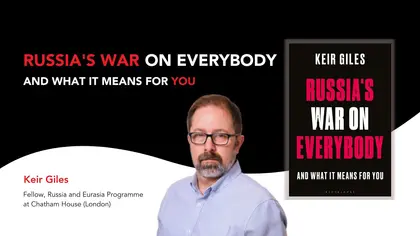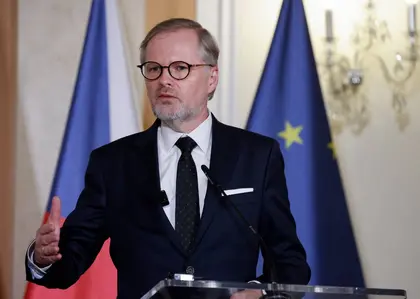In his incisive book Russia’s War on Everybody: And What it Means for You, published in January 2023, Chatham House’s Russia expert Keir Giles clears away some of the fog.
Westerners’ confusion regarding Russia is a result of self-delusion, says Giles. Because they desire peaceful and productive international relations, they think Russia’s rulers (or “Russia” for short) must as well. They could not be more mistaken.
JOIN US ON TELEGRAM
Follow our coverage of the war on the @Kyivpost_official.
“One of the most damaging and dangerous misconceptions about Russia is that at some deep level Russian and Western interests must align, and the two sides must fundamentally desire the same end result in their relationship,” Giles explains. “While the idea is seductive, it is wholly wrong.”
The Westerner’s mistake follows from their unwillingness to face once simple fact: Russia considers itself at war with the West. Within the mental framework of this undeclared war, all relations between Russia and the West must be zero sum. Anything that harms the West helps Russia, without limit to location or scope.
“Putin believes not only in the slow demise of the West but also in hastening it where possible, while suppressing dissent at home in pursuit of his vision of restored domestic order, Soviet-style. It’s often suggested that the need to keep order at home pushes President Putin to even more aggressive behavior abroad in order to ensure his popularity and remove any potential challenges to his rule. If that is correct, Ukraine will not be the last victim to suffer Russian aggression, because ensuring stability within Russia means creating even more instability abroad.”

Russian Ships Blocked from Entering Naval Base in Syria, Stranding Troops, Weapons
As a result of their incapacity to understand this, Western negotiators are constantly outmaneuvered by the Kremlin. Knowing that Westerners want to avoid conflicts, Russia creates them. In the negotiations that follow, Russia then wins concessions in return for offering to temporarily put on hold the conflicts it has initiated. Thus, for example, Russia took France and Germany for a ride in the phony Minsk agreements, wherein Putin promised to leave the rest of Ukraine alone if only its 2014 annexations of Crimea and the Donbas were accepted.
In addition to being at war with Western nations, Russia does not accept the West’s basic idea that human rights matter. For Russia, only power matters. Thus, for example, in 1991, Russian Foreign Minister Sergi Lavrov said “NATO has become a purely geopolitical project aimed at taking over the territories that found themselves ownerless after the disappearance of the Warsaw Pact and after the collapse of the Soviet Union”
Note Lavrov’s words. As Giles points out, they reflect the Kremlin’s view that eastern Europeans need to be owned by someone, that someone should rightfully be Russia.
Unfortunately, the leaders of major Western nations sometimes accept this mental framework, within which the freedoms and lives of eastern Europeans are of no intrinsic worth, but commodities that can be negotiated away behind the backs of those being sacrificed. Such unprincipled “realism,” to which France and Germany are particularly susceptible, always leads to victories for Russia.
Seeing no fundamental distinction between war and peace, Russia has no reservation restricting it from carrying out acts of war, including numerous assassinations and acts of terrorism within Western countries, going so far as to blow up an ammunition factory in Czechia in 2014.
But Russia’s wrecking actions against the West have by no means been limited to military invasions and other overtly violent “kinetic” actions. On the contrary it is employing many other strategies, including cyber warfare and the fomenting of all sorts of criminal activities within the West.
As Giles points out, the present Kremlin leadership represents a merger between the former KGB and the country’s massive organized crime networks. (These were created within Russia’s prison camp system, which has served to bring criminals together since Czarist times.) No distinction should be made between actions taken officially by the Russian government and those performed for it by its armies of criminals and mercenaries deployed worldwide.
To take just two examples, Russia has been looting the West through ransomware attacks (over 75% of which originate in Russia), while its mercenaries forces (dubbed “private miliary companies”) have been taking over countries all over Africa.
Even more dangerous than this has been the subversion of Western political systems. Russian purchases of choice real estate within the UK have given it extensive influence within Britain’s political system, while its funding of Green, Red, and Brown parties on the continent has increased its leverage there.
In other cases, such as Brexit, Russian agitators have been involved on both sides of an issue, with the purpose not being to achieve any particular outcome, but the creation of maximum discord as an end in itself. Most spectacularly, Giles says, Russia achieved an incredible coup through the elevation to the presidency of Donald Trump, a person whose actions while in office, bear all the markings of a Kremlin agent of influence.
“The presidency of Donald Trump showed a spectacular example of what Moscow can achieve by having people in positions of influence and power who will make decisions that favor Russia over their own country. Whether or not Russia’s attack on the US democratic process in 2016 outweighed domestic factors in leading to Trump’s election, the return on investment for Moscow in cultivating Trump over the long term and then assisting his arrival in power was breathtaking. From before his inauguration to the dying days of his presidency, Trump’s actions facilitated many of Russia’s long-term goals for the United States, some of which had previously been considered unrealistic. The roll-call of measures implemented or attempted by Trump that assisted Russian objectives ranged from the high-level strategic to the very local and tactical.”
Giles provides quite a list of Trump actions that favored Moscow, including securing the defeat of the United States in Afghanistan, as well as many other cases, all important, but almost superfluous to mention today as Trump is openly doing all he can to block desperately needed US arms deliveries to Ukraine for the obvious purpose of facilitating Russian conquest of that country.
Giles goes on: “The real limitations on what might benefit Moscow were set by those democratic checks and balances that survived Trump’s administration, and by officials at all levels of government who continued to work on behalf of US national interests even when this was hard to reconcile with instructions coming from the White House. ... But where Trump achieved undoubted success was in joining Moscow in challenging and undermining Western liberal values, weakening US society and social cohesion, eroding US world leadership and global respect, hurrying on the arrival of a post-truth, post-fact information space.”
Giles mentions the weaponization of refugees as yet another instrument of disruption employed by Putin against the West. But he could have gone much further, as with the advent of the Ukraine war, the threat posed by that tactic has greatly escalated.
Russia has engaged in subversion of the West using “Left wing parties” since 1917, and continues to do so today. However, since the fall of communism the Kremlin, following the ideological war plan laid out by Aleksandr Dugin, has created what amounts to an “Altright Comintern,” to subvert the West from the ostensible “Right” as well.
The basic idea is to promote tribalism, through a collection of “Germany First,” “France First,” “America First,” type movements, thereby Balkanizing the West while undermining its unifying foundation of rationalism and Enlightenment humanist ideals. When Putin massacred Aleppo, his real targets were Berlin, Paris, Budapest, and Amsterdam. That effort has shown results. If Russian conquers Ukraine, a much larger slaughter much closer to Europe is on the agenda that threatens to undermine democracies across the continent.
In the face of Russia’s undeclared war, the West has been sleepwalking, allowing the Putin gang to achieve one victory after another. If geostrategic catastrophe is to be avoided, Western leaders need to wake up. Reading Giles’ book would be a good place to start.
The views expressed in this opinion article are the author’s and not necessarily those of Kyiv Post.
Robert Zubrin is an American aerospace engineer. His most recent book, The New World on Mars: What Can We Create on the Red Planet was published February 20, 2024 by Diversion Books.
You can also highlight the text and press Ctrl + Enter






